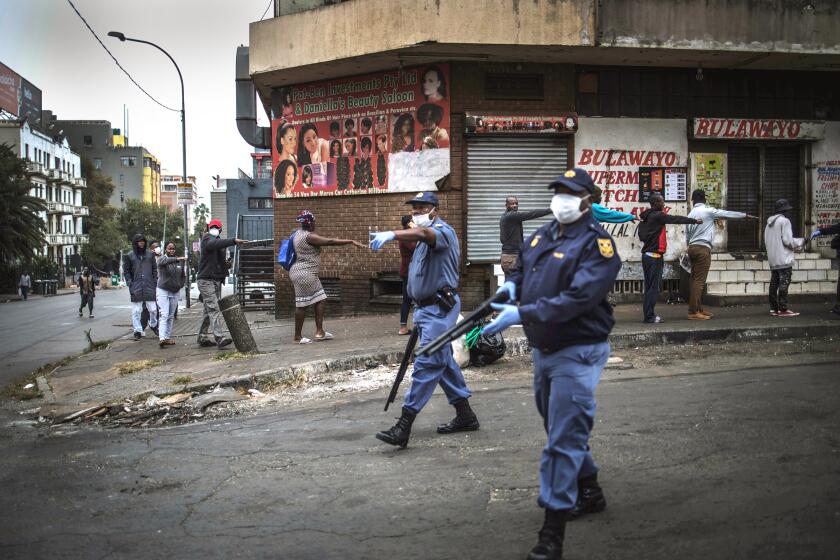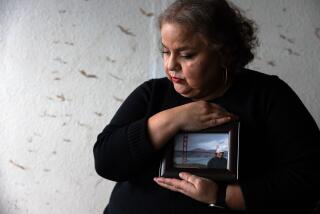Foreign doctors on front lines of COVID-19 fear deportation from U.S.
WASHINGTON — When Sujit Vakkalanka felt he was showing symptoms of COVID-19, he was, naturally, worried about his health. But as the 31-year-old from India waited for the results of his test, he was also concerned about something else: the visa allowing him to remain working in the U.S.
As with many foreign doctors on the front lines of the pandemic in America, Vakkalanka’s H-1B visa is tied to his employment, and he fears he could lose his status if he remains sick and is unable to return to work promptly at a hospital in southwest Virginia.
“If you don’t keep working, you might sometimes be deported,” the internist said.
Vakkalanka said he wasn’t surprised he was running a fever. The hospital has seen multiple cases of coronavirus, including a patient he treated directly. And when two practitioners with symptoms went into self-isolation, he was called in on a day off. Professionally, he had no qualms about going to work.
“This is our profession,” he said. “This is our job.”
On Saturday, his test results came back negative, but he was told to remain in self-isolation until the symptoms subside. But beneath his sense of duty lies the anxiety over his visa — already uncertain given that it is due to expire, after three years, at the end of June, and the federal government has suspended routine visa services and premium processing for H-1B renewals due to the coronavirus outbreak. That leaves thousands of foreign medical professionals in immigration limbo.
It’s an added weight to bear, said Vakkalanka, and others in the same boat, as they fight the pandemic.
“This feeling that you might be deported in the next three months should not be constantly haunting you, day in and day out,” he said. “It’s one more thing to worry about.”
For those with families in the U.S., the fear runs even deeper. When a foreign doctor on a non-immigrant visa dies in the U.S., dependent family members immediately lose their visa status and could face deportation, they worry.
“God forbid an extreme scenario.… Imagine our family,” said Rahmath Begum, an Indian doctor in Mississippi and mother of three. “We have been here for almost 15 years.”
Vidit Bhargava, a 32-year-old pediatric critical-care fellow working within Stanford University’s healthcare system, is anxious too. Also from India, Bhargava has been working in the U.S. since 2014 on a J-1 non-immigrant visa and has been accepted to a full-time position in Alabama. With visa processing services scaled back, the H-1B visa he needs for the new job is in jeopardy.
“There is a real possibility that once I’m done with this process, not only [may I not] have a job; I may be an illegal immigrant in a country where I’m sweating it out every day in the hospital,” he said.
At week’s end, there were already 28 COVID-19 cases in the Stanford hospital system, officials said, amid concerns there wasn’t enough protective equipment for doctors.
“Nobody is fearful in the hospital of taking care of people. What people are fearful of is that we may expose ourselves to the risk if there aren’t ways for us to protect ourselves,” he said. “Anytime a patient has any respiratory illness, all of those patients end up coming to the ICU.... There isn’t enough personal protective equipment.… Within the next couple of weeks we’re expected to run out.”
Amid the high stakes, Bhargava wishes he didn’t feel the additional pressure of visa uncertainty.
“The last thing I want to think about is prioritizing my visa status when there’s so much else to be done,” he said. “It’s actually terrifying when I think about the fact that I’ve invested so many years of my life here.... [I could] have no job security, no security of where we live.”
In Indiana, another Indian doctor seeking to transition from a J-1 to an H-1B said he has been treating 14 infected patients.
“Trump says that this is a war. And we are fighting a war. We are like soldiers,” said the physician, who asked to remain anonymous for fears over his visa status. “While we’re fighting on the front lines … you really want to give 100%, and all your thoughts should be on one thing. The [visa] stress can be difficult.”
Besides foreign doctors already on American soil, more than 4,000 incoming international medical graduates who last month matched with U.S. residency programs remain in limbo. They’re in need of J-1 visas before July, but with so many American consular services shut down globally, it’s a race against time.
“There’s generally a lot of anxiety in the air about what’s going to happen, because so much of it is really out or our control right now,” said Basim Ali, a 24-year-old Pakistani who matched with a medical residency program in Texas.
Ali said he is in touch with hundreds of other medical trainees across the world who have been accepted to U.S. programs and estimates that each has invested $10,000 to $15,000 in the process.
“People draw loans sometimes to make sure they don’t fall short,” he said. “My investment in this process is now several years old.”
Experts said the need for foreign medical professionals is key to remedying the medical crisis in the U.S.
“If we have any decrease in the number of healthcare providers, let alone [the fact that we’re] needing more, then we’re at risk of not being able to treat people,” said William Pinsky, president and chief executive of the Educational Commission for Foreign Medical Graduates.
Pinsky said he is optimistic the issue will be sorted out, after weeks of dialogue led to a State Department update he views as a commitment to process J-1 and H-1B visas for physicians.
A U.S. Citizenship and Immigration Services spokesperson said petitioners can submit a request to expedite their cases if they meet the criteria.
But many medical workers remain unclear about their status, and Memphis-based immigration lawyer Greg Siskind contended that “it’s still a big mess.”
“They put out basically one or two sentences cryptically to say that they’re going to treat doctors differently than everybody else, but the communication was poor, and it’s still not entirely clear exactly what they meant.”
Siskind believes the process could be far simpler, pointing to a State Department decision recently to waive in-person interviews for H-2 temporary work visas, which he noted is the category used for workers in President Trump’s hotels.
Scenes of coronavirus social distancing around the world.
“Why do they even have to be doing in-person interviews at all [for doctors]?” he asked. “You mean to tell me that hotel workers are important enough that you can waive the interview process, but doctors are not?”
To immigration lawyers like Siskind, the system was flawed even before the coronavirus pandemic. Thousands of Indian doctors on H-1Bs are currently on 20-year waits to receive coveted green cards, he said.
“We just want to maximize the number of colors that are in the healthcare system right now,” he said. “And as far as we know, there’s not a single person at any of these [government] agencies where it’s their job right now to figure this out.”
Malhotra is a special correspondent.
More to Read
Sign up for Essential California
The most important California stories and recommendations in your inbox every morning.
You may occasionally receive promotional content from the Los Angeles Times.












